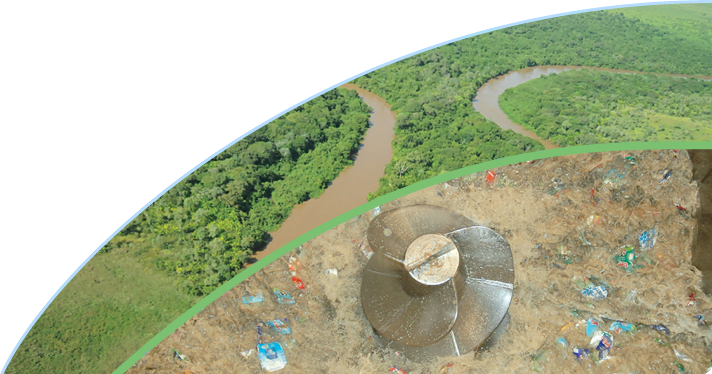accomplishments
• 85% of its customers were
rated highly loyal by the
2011satisfaction survey
• 36 thousand people were trained by the Zero Waste Project last year
• 240 Voluntary Delivery Points, in association with customers and retailing chains, enhance
recycling in the
country
stakeholder's
relationship for
countries in Latin
America and Caribbean
is led by Tet ra Pak Brasil.
son Giovane
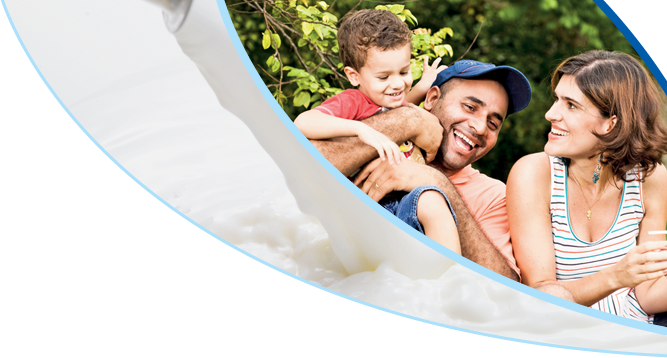
One of the pillars of Tetra Pak's relationship policy is to protect what is human. For that purpose, the company adopts several measures and constantly monitors the sector, consolidating its social responsibility. The company is committed to initiatives that promote human rights, citizenship and environment preservation.
RELATIONSHiP WITH STAKEHOLDERS
Tetra Pak keeps good relationship with suppliers, customers, retailers, consumers, the government and the society because it believes the whole value chain is important to exchange experiences, knowledge, and technology. These liaisons influence and allow for the creation of the environment to manage the business in a sustainable fashion.
For Latin American and Caribbean countries, the policy for relationship with stakeholders is conceived and led by Tetra Pak Brasil. The goal is to establish links with these stakeholders, helping to manage the business in a sustainable fashion.

Interaction chart
• 4.16 •
Employees:
- Conduct management: two Ombudsman channels available: A palavra é Sua (The Word is Yours), for suggestions and complaints as a whole, and Denúncia (Reporting), to anonymously report behaviours that violate the Code of Business Conduct
- Shared Services Centre in the Human Resources department (HR direct), with professionals available to see the employees
- Annual engagement survey
- Health, Safety and Environment Integrated Management System
- Programs to foster heath and quality of life
- Package recycling program
- Open doors and transparency (both the Board and the Presidency are open at all times. Employees have full access by e-mail or onsite)
- Programs for communication face-to-face with the Board or the Presidency: Você Sabia and Café com o Presidente (Did you Know) and Breakfast with the President
- Award programs for initiatives (Tetra Pak Excellence Awards)
- Internal communication channels: Intranet (Orbis), magazine delivered at employees' home every other month (Tetra Pak Acontece)
Suppliers:
- Suppliers assessment process
Customers
- Annual customer satisfaction survey
- Customized service
- Information on market trends
- Newsletter Tetra Pak Inbox, published monthly on
Tetra Pak's Brazilian website. It brings information on major trends in the food production value chain, besides news on the company's research, innovations and launches
- Tetra Pak Magazine: published twice a year in nine different languages; it is available in 170 countries and is coordinated by the corporate team at the headquarters (Sweden)
Retailers:
- Zero Waste training program on packages' handling and storage
Consumers:
- Ombudsman Channel (falecom) available on the internet
- Blog http://nutricaopraticaesaudavel.com.br, with hints on nutrition and healthy diets. The blog also counts on a fan page on Facebook (http://www.facebook.com/nutricaopraticaesaudavel) and a profile on Twitter (http://twitter.com/praticasaudavel)
- Recycling Route Fan Page and Twitter – Recycling Route news channel on Facebook http://www.facebook.com/rotadareciclagem and a profile on Twitter http://www.twitter.com/rotadareciclagem
Government and society:
- Program to support institutions
- Relationship with unions
- Incentive to sports and cultural activities by sponsoring events
- Support to study programs at universities
- Support to selective collection and recycling initiatives
- Campaigns in favour of low income communities
- Environmental education programs
- Milk donation through the website nutriçãopraticaesaudavel.com.br
Press:
- Press releases, press advisory and image database available on http://www.tetrapak.com/br/sobre_a_tetra_pak/imprensa/
SUPPLIERS
• HR2 •
The company promotes innovation of the product and protects the quality of the materials in association with its suppliers, which must meet ISO 14001 requirements. In addition, Tetra Pak uses the global "Supplier Evaluation" program to assess the suppliers in several aspects, from the quality of the products to the internal conditions of their facilities and their labour, hygiene and social-environmental practices. On the other hand, the company uses the global "Customer Evaluation" program to be assessed by them as a customer regarding its commercial attitude, estimates and information assertiveness, attention to suppliers and reliability regarding the company's purchases. The surveys are carried out on a quarterly basis, and the results are sent straight to the headquarters in Sweden, where they are published internally. The "Supplier Evaluation" results are disclosed to all suppliers. For Tetra Pak the relationship with the suppliers is a two way road, working together to promote product quality and innovation. Tetra Pak is assured to have partners who work with top quality materials and services and consequently it contributes so they can grow and win new customers.
All Tetra Pak's raw material suppliers have long been the company's partners and most of them are global. They are all leading companies in their sectors and are highly engaged to environmental and social issues.
For the supply of aluminium foils, the company counts on partnerships with Alcoa and Companhia Brasileira de Alumínio (CBA). Both of them are seriously committed to the environment and social development. Braskem, Tetra Pak's partner for the supply of thermoplastic resins is the leading petrochemical in Latin America and one of the 34 companies that are part of the Entrepreneurial Sustainability Index (Índice de Sustentabilidade Empresarial (ISE)) from BM&FBovespa.
After seven years of joint research with Braskem, the company's supplier of polyethylene for the production of packages, Tetra Pak launched in 2011 the first cap made out of polyethylene from sugar cane ethanol, 100% renewable source, with no difference in terms of quality compared to the traditional plastic cap (made out of fossil fuel). It is one of the innovations that make Tetra Pak Brasil a role model for the group.
This launch is a milestone in the use of this material in the food carton packages industry. From 2012 onwards, all the StreamCap screwing caps used on carton packages will be produced using "green polyethylene" in Brazil.
All cardboard used by the company to produce packages is Forest Stewardship Council (FSC®) certified, ensuring that the raw material comes from forests that are managed in a responsible manner. This certification covers the three dimensions of sustainability, ensuring operations that are environmentally correct, socially fair and economically viable. It allows for the monitoring of the whole chain involving the production of paper for the package, from planting the tree to the final product.
Since June 2008, the certification seal has been printed on the packages produced by Tetra Pak plants in Monte Mor and Ponta Grossa that use certified paper supplied by Klabin. The insertion of the seal on the packages is made as requested by the customers and it has been growing more and more, showing the interest they have in conveying their commitment to environmental issues. 6.82 billion packages were produced with the certification seal in 2011 compared to 4.96 billion in 2010. Currently, the Brazilian operation responds for 40% of Tetra Pak's packages bearing the FSC® seal in the world.
Agreements
Tetra Pak has specific clauses in all agreements executed with suppliers to guarantee respect for human rights. For strategic suppliers the company counts on audits and monitoring of the quality, environment, health and safety processes at the units.
To guarantee compliance with the legislation and respect for Human Rights, the company requires that all agreements include a clause to prevent the use of child labour and other similar practices. Employees' safety is also part of the agreements and this is checked during regular visits to the suppliers; the frequency depends on the size of the company, being them annual, twice a year, or even whenever the agreement is renewed. As a whole, small manufacturers are deemed the riskiest. In case of occurrence of violations, the supplier is excluded from the list of Tetra Pak's partners.
Vinícius,
children
of employee
Reginaldo
Vieira
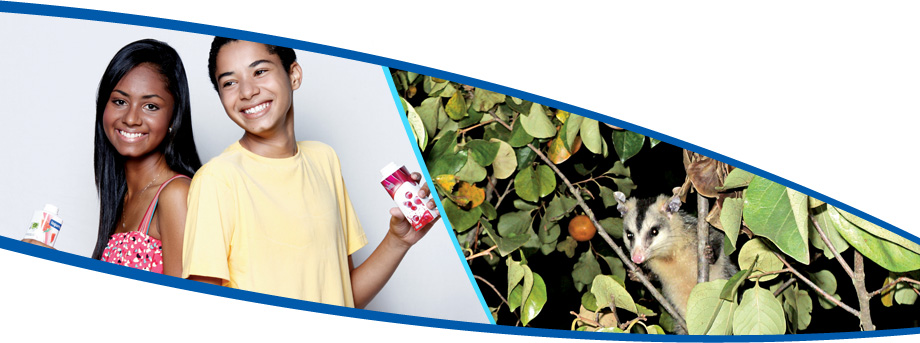
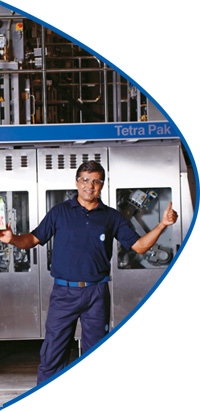
CUSTOMERS
• PR5 •
The customers are Tetra Pak's driving force. The company believes its customers' success reflects directly in its results. By protecting its products, the company becomes its customers' partners and works to promote its businesses providing information on market trends, promoting annual satisfaction surveys and offering customized service.
To build an even closer relationship, the company offers full support to its customers, during the whole production process, from formulation of new products and development of processing and filling systems, to guidance on transport of final product through the distribution channels.
This Market Advisory includes information on trends, which helps in the assessment, feasibility and attractiveness of the product and the definition of the target public. The service also offers marketing and package design support. Aided by an independent consulting firm Tetra Pak annually carries out Customer Satisfaction Surveys with a public representing 70% of the company's sales. The method used was developed by Tetra Pak and it has been improved every year with suggestions from the survey managers, the local consulting firm that carries out the survey and the customers. Interviews with customers are onsite or by telephone and there are specific questionnaires for the strategic contacts at the customer and those who relate to Tetra Pak in the Purchase and Supply, Production, Technical Service, Engineering and Marketing departments. The results are assessed internally and used to prepare plans of action. The improvement actions are regularly reported to customers.
The results point at continuous improvement. The Customer Loyalty index that reflects customers' loyalty and reliability exceeded 83% in 2008, went up to 85% in 2010 and 90% in 2011. In 2009 the survey was not carried out so the calendar could be adjusted to the company's strategic plan.
Retailers
Tetra Pak, using the Zero Waste program, builds awareness and teaches the retailers' employees about the best practices of palletizing, handling, transport, storage and display of the brand's packages.
Good presentation of the packages at the point-of-sale increases sales and guarantee the product's integrity and quality for the consumer and less waste for the retailer. Over the past four years, over a hundred thousand people have done the course that is offered at no cost. The content of the program includes institutional information about Tetra Pak as well as information on sustainability and best practices for handling and storage and the importance of reducing waste owing to logistics problems.
In 2011, the Zero Waste program trained more than 36 thousand people, including 5 thousand employees of Tetra Pak's customers from Production, Stock, Distribution, Dispatch, Quality and Marketing departments. The remaining participants included supermarkets, wholesalers and distributors' employees, promoters, managers, and coordinators of stores and categories.
Consumers
To make environmental awareness concepts reach all consumers, Tetra Pak Brasil keeps a contact channel with the public in the internet (http://www.tetrapak.com/br/contato), besides a blog with hints on nutrition and healthy diet (http://nutricaopraticaesaudavel.com.br), including a fan page on Facebook and a profile on Twitter.
It also keeps the Environmental Culture Portal at Schools (www.culturaambientalnasescolas.com.br), launched in 2009 and focused on Elementary school students and teachers. The portal brings content developed along 12 years of the project, including topics such as environmental education and citizenship and the benefits of waste selective collection and recycling. In addition to an exclusive area for teachers – with hints to put those topics into practice in the classroom – there are educational games, videos and suggestions of workshops and activities.
Another tool is the Recycling Route portal (http://www.rotadareciclagem.com.br). The website uses Google Maps search tool to locate the Voluntary Delivery Points (VDPs), cooperatives and shops that receive or buy long life packages and other recyclables. Besides the internet services, Tetra Pak also developed an application for mobile phone. Now, the service is available as an application for iPhone and iPad.
The initiative to join sustainability and technology should help consumers to find selective collection points. The application can be downloaded for free at the Apple Store (http://itunes.apple.com/md/app/rota-da-reciclagem-tetra-pak/id483224874?mt=8). The objective is to facilitate access to this information and increase the volume of long life packages recycled.
EMPLOYEES
After Sweden, the headquarters, Tetra Pak Brasil is the major talents exporter in the group. The employees are innovators, pioneers and a reference to other markets of the company. For this reason, Tetra Pak Brasil thrives to rank among the best companies in the country to work for.
In 2011, the company launched OneHR, which gathers administrative internal services – Human Resources, payment and administrative processes – to all countries influenced thereby, with service rendered in Portuguese, English and Spanish. In a scale of 5 points, the centre has an average evaluation of 4.1.
With administrative centralization, the company guarantees to focus on employees of the units in the analysis of the strategy of the areas and the monitoring and evaluation of talents, services and performance, besides carrying out action plans, improving even more the productivity rates.
The company keeps a health, safety and environment Integrated Management System as well as programs towards health and quality of life. The relationship between the company and the employees is measured by carrying out annual engagement surveys.
Open doors and transparency are very important and every employee has access by e-mail or onsite to both the Board and the Presidency, which can also be reached through the face-to-face communication program. The company keeps two Ombudsman channels to employees: A Palavra é Sua (The Word is Yours), for suggestions and complaints in general, and Denúncia (Reporting), for anonymously reporting behaviours that violate the company's Code of Business Conduct.
In 2010 and 2011, Tetra Pak Brasil participated in the Guia Você S.A. Exame – the 150 Best Companies to Work For survey, ranking in the list in both years. The survey is the result of a study conducted in association with Editora Abril and the Fundação Instituto de Administração (FIA) from the University of São Paulo. Out of the 542 companies registered, 225 were selected to receive visits from journalists based on the assessment of practices and questionnaires answered by employees. Out of those, the best 150 were listed in the annual publication. This recognition is, above all, an incentive for the company to continue listening to its employees, improving its processes to guarantee the engagement and happiness of employees, both essential for the success of businesses.
HR Policy
The company' human resources policies and practices foster free association and collective negotiation, supporting meetings to decide on working hours, participation in cooperative, plant commission and Internal Commission for the Prevention of Accidents (Cipa). The collective negotiation agreements executed include 100% of the employees. Operational changes are notified four weeks in advance.
Employees' profile
| Number of employees per type of job | 2010 | 2011 |
|---|---|---|
| Board of Directors | 30 | 34 |
| Management | 124 | 128 |
| Head of department/coordination/supervision | 117 | 138 |
| Administrative | 341 | 372 |
| Operating | 572 | 610 |
| Technicians | 289 | 329 |
| Outsourced | 686 | 650 |
| Number of employees per type of agreement | 2010 | 2011 |
| Interns | 42 | 24 |
| Trainees | 2 | 2 |
| Part-time | 0 | 0 |
| Number of employees per region | 2010 | 2011 |
| Southern region | 332 | 362 |
| South-eastern region | 1081 | 1177 |
| Mid-western region | 32 | 38 |
| North-eastern region | 30 | 36 |
| North region | 0 | 0 |
| Turnover rate per gender (%) | 2010 | 2011 |
| Male | 86.0% | 89.0% |
| Female | 14.0% | 11.0% |
| Turnover rate per age (%) | 2010 | 2011 |
| Under 30 | 37.0% | 41.0% |
| From 30 to 50 | 55.0% | 53.0% |
| Over 50 | 8.0% | 6.0% |
| Turnover rate per region (%) | 2010 | 2011 |
| Southern region | 12.0% | 10.5% |
| South-eastern region | 5.2% | 8.5% |
| Mid-western region | 3.1% | 10.5% |
| North-eastern region | 0.0% | 2.8% |
| North region | 0 | 0 |
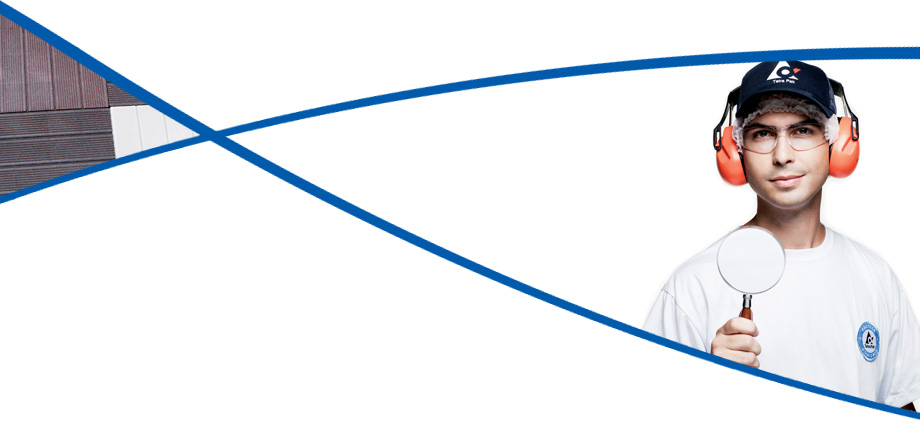
Trainee
Besides the interns and trainees' programs under course, the company will start in 2012 the program for the acceleration of talents that aims at supplying internal production needs, and gathering all training programs in one (English, international courses at Tetra Pak Academy, development of leaders, technicians and engineers and specific courses).
Benefits
Tetra Pak offers medical assistance to the dependants without any cost for the employee, dental care and reimbursement for expenses at drugstores. Moreover, it offers monthly basic food supplies, Christmas gift baskets, children's kits to all employees and free meals and transport to employees located in Monte Mor (SP) and Ponta Grossa (PR). All these benefits are also offered to apprentices under 18 years old. The interns get stipends, medical assistance and support for meals and transport.
Tetra Pak partly reimburses costs with continued education, such as languages, graduate and post-graduate courses provided the employees' professional performance is adequate and the course is related to their job description.
Tetra Pak's Pension Plan covers retirement, benefits for impairment or pension for death, minimum benefit and the modalities applied in case of dismissal. The company's pension plan is based on fixed contributions: the employees can choose to contribute with 1% to 4% of their salary as basic contribution, and additionally with 1% to 8% as voluntary contribution, being 12% the highest percentage for the employees' contribution. For employees with a salary higher than 18 social welfare units (UP's) and for employees who choose for the basic contribution and have salaries higher than 12 UP's, the employer contributes with 50%.
Training and development
There were 97 scholarship holders for continued education in 2010 and 85 in 2011, representing incentives amounting to BRL343,730 and BRL256,418, respectively.
In addition to the training initiatives, Tetra Pak assesses the performance of 100% of its employees on a yearly basis, contributing for the development of their careers.
| Employees' training | ||||||
|---|---|---|---|---|---|---|
| 2010 | 2011 | |||||
| Total credit hours |
Employees per category |
Hours per employee | Total credit hours |
Employees per category |
Hours per employee | |
| Behavioural | 7,031 | 477 | 14 | 8,874 | 1,121 | 14 |
| Technical | 30,155 | 1491 | 20 | 12,244 | 841 | 16 |
| International | 3,630 | 73 | 49 | 101 | 6 | 15 |
| Safety | 10,528 | 1,369 | 7 | 9,264 | 595 | 236 |
| Further education and languages | 79,200 | 276 | 286 | 74,350 | 314 | 14 |
| Total | 130,544 | 1,572 | 83 | 104,833 | 1,488 | 70 |
Occupational Health and Safety
Tetra Pak exercises freedom of action regardless of any agreements with unions. It cares about the employees' individual and collective safety developing regular actions and campaigns.
Following a strategic decision by Tetra Pak, the Safety pillar is currently reviewing and reinforcing the use of the Proteção (Protection) safety tool, previously known as Podar. The action was also extended to all the company's plants and offices. By implementing this tool the goal is that every employee receives training and become aware on the importance of accident prevention.
With this initiative, the company moves from using a reactive indicator, which focuses on corrective actions, to a preventive indicator, to avoid the occurrence of accidents at the plant. Adoption has been comprehensive, although training has not yet reached all employees and service providers. Training shall be resumed just after the Internal Week on Workplace Accident Prevention (Sipat). The Sipat is an annual event that counts on a very creative schedule to build awareness towards accident and ill-health prevention.
In both industrial plants several campaigns are carried out on a regular basis to promote health and safety, as well as the Sipat that happens annually. In 2010, there were specific actions such as Carnival campaign, Defensive Driving and the Accident Prevention Day. In 2011, the highlights were the Carnival campaign, the Health Week and the Guardian Operation.
| Occupational Health and Safety indicators | ||
|---|---|---|
| Monte Mor | Ponta Grossa | |
| Accidents with over 15 days leave | 2 | 3 |
| Accidents with less than 15 days leave | 2 | 1 |
| Accident without leave | 2 | 3 |
| Occupational ill-health | 0 | 0 |
| Number of working days missed | 31 | 49 |
SOCIETY
• EC8 •
Voluntary Work
The Voluntary Committee created at the Monte Mor (SP) plant consists of representatives from several departments, organizes, among others, campaigns such as "Warm Clothes Campaign", food donation and "Make a Child Smile" campaign, to aid low income communities and charity institutions.
Milk donation
Since 2001, Tetra Pak supports the Donate Milk campaign. For every hit to the blog nutricaopraticaesaudavel.com.br, 50 millilitres of long life milk are donated to a chosen charity. For details about the donation visit the blog.
Dreaming of a Hunger-free Christmas
Since 2005, Tetra Pak participates in the food collection campaign Dreaming of a Hunger-free Christmas, an initiative from Ação da Cidadania contra a Fome, a Miséria e pela Vida (Citizenship Action Against Hunger, Poverty and for Life). To participate, the donator visits the website www.tetrapak.com.br and sends a virtual Christmas card to their friends, relatives or workmates. For each card that is sent, the company delivers 1 litre of long life milk to be part of basic food supplies that are distributed around the cities of São Paulo, Campinas and Ponta Grossa. In 2010 and 2011, 33 thousand litres of long life milk were donated.
Parmegiana Festival
The 5th Parmegiana Festival organized by Tetra Pak's Voluntary Work Committee in Monte Mor reached, once again, a huge number of participants. 233 invitations were sold for BRL25.00 each. Out of the amount raised (BRL5,825.00), the Committee profited 85%, which was sent to Monte Mor's elderly home, benefiting 33 elderly residents.
Disaster relief
Committed to the environment and to the society, Tetra Pak supports programs for disaster relief all over the world and accepts visitors at its facilities so they can get to know the quality of its products and services in a transparent fashion.
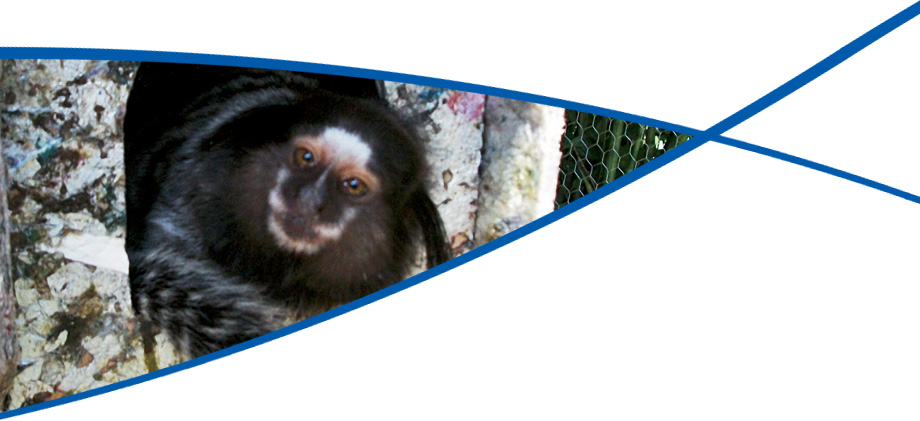
Social-environmental responsibility
Environmental education
After 13 years in place, the Environmental Education Project was reformulated in 2010 owing to growing demand. Besides distributing 4.5 thousand educational kits, we created the Environmental Culture Portal at Schools (www.culturaambientalnasescolas.com.br), with games, teachers' room, news and technical articles.
Even after so many years the project still receives new material. An example of that is the film Carbono Metano, produced with funds provided by the Rouanet law (tax incentive), aimed at producing a series for every region in Brazil, just like the episodes Amazônia (launched in 2011) and Cerrado (next film to be released).
The project also counts on teachers' workshops. In the municipality of Breves, Marajó island (PA), a partnership with the No Olhar NGO allowed state school teachers to participate in Teaching Workshops promoted by Tetra Pak. During the workshops, 40 teachers were instructed on how to work these topics in the classroom and also received the environmental education kit containing handbooks, books, videos, posters and a magazine. The action contributed to the education of over three thousand elementary school children. In the municipality of Jarú (RO), in 2010, the workshop counted on 42 participants in association with the Municipal and State Education Departments, and representatives from the newly-created Municipal Environment Department do Environment.
Biodiversity protection
Founded in 1987, the Associação Mata Ciliar (Riparian Forest Association), an entity based in the municipality of Pedreira (SP) and with units in Jundiaí and Águas de Lindoia (SP), has been receiving recycled roof tiles and boards from Tetra Pak to build cubicles and equipment to monitor animals. The entity develops activities for environmental preservation and is a role model in animal rehabilitation with the Wild Animal Rehabilitation Centre and in research with the Brazilian Centre for the Preservation of Neotropical Felines.
- Protecting Life in the Amazon Project:
In December 2011, Tetra Pak, in association with the Associação Amigos do Peixe Boi NGO, organized an environmental education expedition along the Uatumã river, a tributary of the north bank of the Amazon river (AM). The goal is to take information regarding preservation of the local fauna, especially the manatees, to around 26 riverside communities where over 8,000 people live. The action is coordinated by a group of experts from the Centre for the Preservation and Research of Aquatic Mammals of Vila de Balbina (AM) and lasted 15 days. To support the initiative, Tetra Pak provided a regional boat totally fitted to meet the needs of the team that organized lectures and fun activities to all sorts of audiences, focusing on building awareness among children. In addition to the message of the importance of preserving the manatee, the groups handed out handbooks and leaflets on the importance of treating waste in the right way to avoid contamination of the rivers.
- Supermarket boat: On a supermarket boat kept by Nestlé that navigates across the Belém (PA) region, Tetra Pak installed a voluntary delivery point for recyclables, with an environmental educator that visits the riverside schools. The initiative started in 2010 with basic information and by the end of 2011 it included information about recycling and other environmental education actions.
- Cinema (Re)Cycle: It is an itinerant event that promotes the free showing of national films aiming at promoting the importance and benefits of recycling for the community; the Cinema (Re)Cycle shows films at squares in the cities around Brazil, promoting recycling workshops for children. In 2011 about 20,000 people and 28,000 children benefited from the program. The project visited 40 municipalities in the Mid-western region. Since its launch in early 2007, the project has already visited over 210 municipalities all across the country.
- Environmental Scene: The Environmental Scene Project provides itinerant theatre for environmental education. The goal is to take culture, leisure and environmental awareness by using puppet shows. It also conveys hints and simple teachings that help children and their families to understand the importance of selective collection, recycling and environmental preservation.
During 2011 this new initiative by Tetra Pak was performed in 80 municipalities in the Southern and South-eastern regions in Brazil, promoting integration of school communities, treating the sustainability issue in a playful way, and spreading information of utmost importance about this issue to those regions visited.
To make the action fit the local realities a producer visits the municipalities in advance and gets in touch with the main state schools, public bodies and private institutions to show them details about the project. Entities responsible for waste collection and disposal, as well as collectors' cooperatives are also surveyed.
The performance is an interactive, funny story based on education, environment, teachings and hints for children. The performance consists of a group of artists and puppet and marionette manipulators playing the role of several characters, such as the parrot, the toucan, the macaw, and the owl.
Every child participating gets an interactive handbook summarizing the performance, containing several didactic and interactive games about the topics presented and a pen made out of plastic-aluminium recycled from Tetra Pak packages.
- Urban Sculptures Project: It offers art, architecture and design students the opportunity to develop sculpture and 3D artwork projects from recycled materials.
This is the goal of the Urban Sculpture Project that was supported by Tetra Pak. In 2011, the event took place at Victor Civita Square in the city of São Paulo, which is a space dedicated to the discussion of environmental and nature preservation issues.
Through art, Tetra Pak encouraged thinking about sustainability by showing an exhibition about the Brazilian contemporaneous artistic production diversity. Besides the audience at the square, the website was visited 22,045 times. The project was carried out in association with the Verdescola Institute.
Incentive to Sports
Over the past few years, Tetra Pak has also
consolidated its policy to promote sports,
which represents a great opportunity for social insertion.
The company supports actions to build
environmental awareness to several audiences.
In addition, Tetra Pak Open Tennis was created to associate
sustainability, which is strongly present in the company's
corporate conduct, with sports and quality of life.
During the tournament, besides promoting selective collection
and installing a voluntary delivery point at the club, Tetra Pak
provided participants with a demo of the process to recycle long life
packages and environmental education actions especially
aimed at children. The games held in Campinas (SP) were
broadcasted by the BandSports channel and received
journalistic coverage. Shaped as a men and women international
professional tennis tournament, the competition distributed prizes
and counted points for world ranking. National and international
players participated in the 2011 tournament, which was supervised
by Association of Tennis Professionals (ATP), together
with International Tennis Federation (ITF) and
Brazilian Tennis Confederation (CBT).
 Click
Clickto enlarge
GOVERNMENT
• 4.12 | 4.13 | EC4 | SO5 | SO6 •
Tetra Pak is associated to social-environmental entities such as the Ethos Institute and it is one of the founders of Cempre, whose principles keep full synergy with the company's Mission, Vision and Core Values. It is also associated to the American and Swedish Chambers owing to the importance and representativeness of these bodies.
Cempre (Brazilian Business Commitment to Recycling): Tetra Pak is one of the founders of the Brazilian Business Commitment to Recycling, a non for profit organization formed in 1992 by around 30 companies aiming at promoting recycling within the concept of integrated waste management and building awareness in the society of the importance of the reduction, reuse and recycling of solid waste. It is the most important association addressing this issue in Latin America.
Global Compact: signatory of the Global Compact, proposed by UN in 1999. It gathers companies, UN agencies and the civil and entrepreneurial society to support ten principles in the areas of human rights, work, environment, and corruption prevention.
Tetra Pak has no operations or agreements with any state company. Several policies – such as the Code of Business Conduct, the Anticorruption Policy, the Policy on Supplies and the Policy on Gifts – provide transparency of the relationships between the company and government officials, and it is unacceptable to receive payments, hospitality or other advantages that may influence a decision, create a dependent relationship, or that cannot be made public. The internal instruction is to discuss in advance with senior management and co-workers before accepting gifts, payments, benefits or hospitality.
Tetra Pak is a member of the Linha Azul project by the Brazilian IRS, which offer a seal of quality to customs and tax procedures to promote a safe logistics chain. The company has no pending issues at the Brazilian IRS and has not been submitted to special enforcement regimes over the past three years.
The corporate system and accounting control are computerized, which facilitates the management of goods in stock by distinguishing goods that come from overseas and those for export. All internal controls are annually audited by external auditors, and every other year by the Tetra Laval Group, so to ensure regular compliance with registration, documental, and especially, tax and customs obligations.
According to the internal procedures, the company makes no contributions or donations to political parties, officials and institutions related thereto.
| Funds received from the government (thousand BRL) | ||
|---|---|---|
| 2010 | 2011 | |
| Rouanet Law | 4,630 | 5,868 |
| Sponsorship (Law # 8,313/91) | - | 5,997 |
| Sports Incentive (Federal) | 500 | 1,400 |
| Sports Incentive (Federal) | - | 200 |
